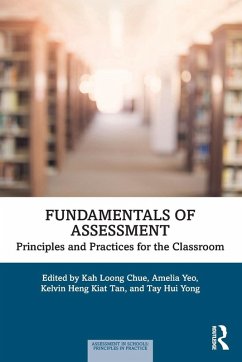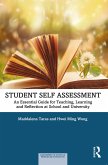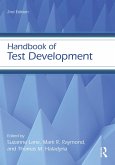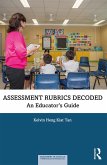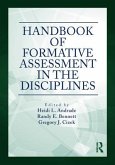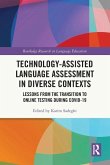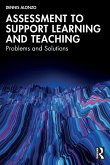Fundamentals of Assessment
Principles and Practices for the Classroom
Herausgeber: Chue, Kah Loong; Tan, Kelvin Heng Kiat; Yeo, Amelia
Fundamentals of Assessment
Principles and Practices for the Classroom
Herausgeber: Chue, Kah Loong; Tan, Kelvin Heng Kiat; Yeo, Amelia
- Broschiertes Buch
- Merkliste
- Auf die Merkliste
- Bewerten Bewerten
- Teilen
- Produkt teilen
- Produkterinnerung
- Produkterinnerung
Offering a valuable introduction to those beginning their journey into educational assessment, this book provides both teachers and students insights into the challenging world of designing, implementing, and interpreting classroom assessments. A must read for trainee teachers, education policy makers and in-service teachers.
Andere Kunden interessierten sich auch für
![Student Self-Assessment Student Self-Assessment]() Maddalena Taras (UK University of Sunderland)Student Self-Assessment45,99 €
Maddalena Taras (UK University of Sunderland)Student Self-Assessment45,99 €![Handbook of Test Development Handbook of Test Development]() Handbook of Test Development129,99 €
Handbook of Test Development129,99 €![Assessment Rubrics Decoded Assessment Rubrics Decoded]() Kelvin Heng Kiat TanAssessment Rubrics Decoded41,99 €
Kelvin Heng Kiat TanAssessment Rubrics Decoded41,99 €![Handbook of Formative Assessment in the Disciplines Handbook of Formative Assessment in the Disciplines]() Handbook of Formative Assessment in the Disciplines156,99 €
Handbook of Formative Assessment in the Disciplines156,99 €![Rigor and Assessment in the Classroom Rigor and Assessment in the Classroom]() Barbara R. Blackburn (USA Blackburn Consulting Group)Rigor and Assessment in the Classroom40,99 €
Barbara R. Blackburn (USA Blackburn Consulting Group)Rigor and Assessment in the Classroom40,99 €![Technology-Assisted Language Assessment in Diverse Contexts Technology-Assisted Language Assessment in Diverse Contexts]() Technology-Assisted Language Assessment in Diverse Contexts46,99 €
Technology-Assisted Language Assessment in Diverse Contexts46,99 €![Assessment to Support Learning and Teaching Assessment to Support Learning and Teaching]() Dennis Alonzo (Australia UNSW)Assessment to Support Learning and Teaching42,99 €
Dennis Alonzo (Australia UNSW)Assessment to Support Learning and Teaching42,99 €-
-
-
Offering a valuable introduction to those beginning their journey into educational assessment, this book provides both teachers and students insights into the challenging world of designing, implementing, and interpreting classroom assessments. A must read for trainee teachers, education policy makers and in-service teachers.
Produktdetails
- Produktdetails
- Assessment in Schools: Principles in Practice
- Verlag: Taylor & Francis Ltd
- Seitenzahl: 280
- Erscheinungstermin: 24. November 2025
- Englisch
- Abmessung: 234mm x 156mm x 15mm
- Gewicht: 422g
- ISBN-13: 9781032878256
- ISBN-10: 1032878258
- Artikelnr.: 75016180
- Herstellerkennzeichnung
- Libri GmbH
- Europaallee 1
- 36244 Bad Hersfeld
- gpsr@libri.de
- Assessment in Schools: Principles in Practice
- Verlag: Taylor & Francis Ltd
- Seitenzahl: 280
- Erscheinungstermin: 24. November 2025
- Englisch
- Abmessung: 234mm x 156mm x 15mm
- Gewicht: 422g
- ISBN-13: 9781032878256
- ISBN-10: 1032878258
- Artikelnr.: 75016180
- Herstellerkennzeichnung
- Libri GmbH
- Europaallee 1
- 36244 Bad Hersfeld
- gpsr@libri.de
Kah Loong Chue is a Senior Lecturer at the Psychology, Child & Human Development Department in the National Institute of Education, Nanyang Technological University, Singapore. His research interests include assessment, student well-being, and motivation. He teaches mainly assessment courses in the university. Amelia Yeo is an Assistant Professor at the Psychology, Child & Human Development Department in the National Institute of Education, Nanyang Technological University, Singapore. Her research interests and publications centre on the effect of gesture and embodiment in learning and communication. Kelvin Heng Kiat Tan is an Associate Professor in the Department of Learning Sciences and Assessment at the National Institute of Education, Nanyang Technological University, Singapore. He is one of the series editors for the Routledge book series Assessment in Schools: Principles in Practice. Tay Hui Yong is a Senior Lecturer in the Department of Learning Sciences and Assessment at the National Institute of Education, Nanyang Technological University, Singapore. Her research interests include self-regulated learning, authentic assessment, assessment Leadership, assessment for learning and more recently, technology in assessment.
Table of contents
List of Contributors
Part 1: Foundations of Assessment
1. Assessment Principles in Practice
Kah Loong Chue & Grace Koh
2. Assessment and Examination Policies in the Singapore Education System.
Karen Lam, Leong Wei Shin, Alwyn Pang, & Tan Kuo Cheang
3. Defensible Assessment Practices in Classroom Contexts: Contemplating the
Role of Validity and Fairness
Amirhossein Rasooli & Lin Rongchan
4. Using Standards to Advance Student Learning
Claire Wyatt Smith & Megan Kimber
Part 2: Assessment Design and Development
5. Assessment and the Bigger Picture of Curriculum
Christina Ratnam-Lim & Teo Juin Ee
6. Designing and Crafting Traditional Classroom Assessment
Wong Chuan Yuh Ethan
7. Designing Quality Authentic Assessment
Christopher R. Gareis & Tay Hui Yong
8. Designing Quality Rubrics for Classroom Assessment
Lin Rongchan
9. Item Analysis in Practice: A Guide to Enhancing Teaching and Learning
Yvonne Seng Bee Gek & Kah Loong Chue
Part 3: Approaches to Formative Assessment
10. Impact of Classroom Culture on Assessment for Learning
Roszalina Rawi
11. From Passive Learners to Active Assessors: Empowering Students through
Embracing Student Self-Assessment and Peer Assessment
Wong Hwei Ming
12. Supporting learners with assessment: An elementary approach
Tan Heng Kiat Kelvin
13. Fundamentals of Feedback
Durka Devi Palaraju & Tan Heng Kiat Kelvin
14. Assessment Feedback for Character and Citizenship Education - The
30-Day Gratitude Adventure
Kelvin Heng Kiat Tan, Jessica To, Dominique Aluquin, & Lye Kit Wan
Part 4: Sustainable Assessment for the Future
15. Twenty-first Century Competencies assessment using formative learning
analytics in K-12: Case examples from Singapore
Elizabeth Koh Ruilin, Victor Lim Fei, & Christin Jonathan
16. Social and Emotional Learning Assessment: Significance, Approaches,
Challenges, and Future Directions
Isabella Wong Yuen Fun
17. Assessment and Differentiation for diverse learners
Durka Devi Palaraju & Heng Tang Tang
18. Technology in Assessment
Bengi Birgili & Chue Kah Loong
19. Assessment and Wellbeing
Amelia Yeo & Lee Yingmin
Index
List of Contributors
Part 1: Foundations of Assessment
1. Assessment Principles in Practice
Kah Loong Chue & Grace Koh
2. Assessment and Examination Policies in the Singapore Education System.
Karen Lam, Leong Wei Shin, Alwyn Pang, & Tan Kuo Cheang
3. Defensible Assessment Practices in Classroom Contexts: Contemplating the
Role of Validity and Fairness
Amirhossein Rasooli & Lin Rongchan
4. Using Standards to Advance Student Learning
Claire Wyatt Smith & Megan Kimber
Part 2: Assessment Design and Development
5. Assessment and the Bigger Picture of Curriculum
Christina Ratnam-Lim & Teo Juin Ee
6. Designing and Crafting Traditional Classroom Assessment
Wong Chuan Yuh Ethan
7. Designing Quality Authentic Assessment
Christopher R. Gareis & Tay Hui Yong
8. Designing Quality Rubrics for Classroom Assessment
Lin Rongchan
9. Item Analysis in Practice: A Guide to Enhancing Teaching and Learning
Yvonne Seng Bee Gek & Kah Loong Chue
Part 3: Approaches to Formative Assessment
10. Impact of Classroom Culture on Assessment for Learning
Roszalina Rawi
11. From Passive Learners to Active Assessors: Empowering Students through
Embracing Student Self-Assessment and Peer Assessment
Wong Hwei Ming
12. Supporting learners with assessment: An elementary approach
Tan Heng Kiat Kelvin
13. Fundamentals of Feedback
Durka Devi Palaraju & Tan Heng Kiat Kelvin
14. Assessment Feedback for Character and Citizenship Education - The
30-Day Gratitude Adventure
Kelvin Heng Kiat Tan, Jessica To, Dominique Aluquin, & Lye Kit Wan
Part 4: Sustainable Assessment for the Future
15. Twenty-first Century Competencies assessment using formative learning
analytics in K-12: Case examples from Singapore
Elizabeth Koh Ruilin, Victor Lim Fei, & Christin Jonathan
16. Social and Emotional Learning Assessment: Significance, Approaches,
Challenges, and Future Directions
Isabella Wong Yuen Fun
17. Assessment and Differentiation for diverse learners
Durka Devi Palaraju & Heng Tang Tang
18. Technology in Assessment
Bengi Birgili & Chue Kah Loong
19. Assessment and Wellbeing
Amelia Yeo & Lee Yingmin
Index
Table of contents
List of Contributors
Part 1: Foundations of Assessment
1. Assessment Principles in Practice
Kah Loong Chue & Grace Koh
2. Assessment and Examination Policies in the Singapore Education System.
Karen Lam, Leong Wei Shin, Alwyn Pang, & Tan Kuo Cheang
3. Defensible Assessment Practices in Classroom Contexts: Contemplating the
Role of Validity and Fairness
Amirhossein Rasooli & Lin Rongchan
4. Using Standards to Advance Student Learning
Claire Wyatt Smith & Megan Kimber
Part 2: Assessment Design and Development
5. Assessment and the Bigger Picture of Curriculum
Christina Ratnam-Lim & Teo Juin Ee
6. Designing and Crafting Traditional Classroom Assessment
Wong Chuan Yuh Ethan
7. Designing Quality Authentic Assessment
Christopher R. Gareis & Tay Hui Yong
8. Designing Quality Rubrics for Classroom Assessment
Lin Rongchan
9. Item Analysis in Practice: A Guide to Enhancing Teaching and Learning
Yvonne Seng Bee Gek & Kah Loong Chue
Part 3: Approaches to Formative Assessment
10. Impact of Classroom Culture on Assessment for Learning
Roszalina Rawi
11. From Passive Learners to Active Assessors: Empowering Students through
Embracing Student Self-Assessment and Peer Assessment
Wong Hwei Ming
12. Supporting learners with assessment: An elementary approach
Tan Heng Kiat Kelvin
13. Fundamentals of Feedback
Durka Devi Palaraju & Tan Heng Kiat Kelvin
14. Assessment Feedback for Character and Citizenship Education - The
30-Day Gratitude Adventure
Kelvin Heng Kiat Tan, Jessica To, Dominique Aluquin, & Lye Kit Wan
Part 4: Sustainable Assessment for the Future
15. Twenty-first Century Competencies assessment using formative learning
analytics in K-12: Case examples from Singapore
Elizabeth Koh Ruilin, Victor Lim Fei, & Christin Jonathan
16. Social and Emotional Learning Assessment: Significance, Approaches,
Challenges, and Future Directions
Isabella Wong Yuen Fun
17. Assessment and Differentiation for diverse learners
Durka Devi Palaraju & Heng Tang Tang
18. Technology in Assessment
Bengi Birgili & Chue Kah Loong
19. Assessment and Wellbeing
Amelia Yeo & Lee Yingmin
Index
List of Contributors
Part 1: Foundations of Assessment
1. Assessment Principles in Practice
Kah Loong Chue & Grace Koh
2. Assessment and Examination Policies in the Singapore Education System.
Karen Lam, Leong Wei Shin, Alwyn Pang, & Tan Kuo Cheang
3. Defensible Assessment Practices in Classroom Contexts: Contemplating the
Role of Validity and Fairness
Amirhossein Rasooli & Lin Rongchan
4. Using Standards to Advance Student Learning
Claire Wyatt Smith & Megan Kimber
Part 2: Assessment Design and Development
5. Assessment and the Bigger Picture of Curriculum
Christina Ratnam-Lim & Teo Juin Ee
6. Designing and Crafting Traditional Classroom Assessment
Wong Chuan Yuh Ethan
7. Designing Quality Authentic Assessment
Christopher R. Gareis & Tay Hui Yong
8. Designing Quality Rubrics for Classroom Assessment
Lin Rongchan
9. Item Analysis in Practice: A Guide to Enhancing Teaching and Learning
Yvonne Seng Bee Gek & Kah Loong Chue
Part 3: Approaches to Formative Assessment
10. Impact of Classroom Culture on Assessment for Learning
Roszalina Rawi
11. From Passive Learners to Active Assessors: Empowering Students through
Embracing Student Self-Assessment and Peer Assessment
Wong Hwei Ming
12. Supporting learners with assessment: An elementary approach
Tan Heng Kiat Kelvin
13. Fundamentals of Feedback
Durka Devi Palaraju & Tan Heng Kiat Kelvin
14. Assessment Feedback for Character and Citizenship Education - The
30-Day Gratitude Adventure
Kelvin Heng Kiat Tan, Jessica To, Dominique Aluquin, & Lye Kit Wan
Part 4: Sustainable Assessment for the Future
15. Twenty-first Century Competencies assessment using formative learning
analytics in K-12: Case examples from Singapore
Elizabeth Koh Ruilin, Victor Lim Fei, & Christin Jonathan
16. Social and Emotional Learning Assessment: Significance, Approaches,
Challenges, and Future Directions
Isabella Wong Yuen Fun
17. Assessment and Differentiation for diverse learners
Durka Devi Palaraju & Heng Tang Tang
18. Technology in Assessment
Bengi Birgili & Chue Kah Loong
19. Assessment and Wellbeing
Amelia Yeo & Lee Yingmin
Index

